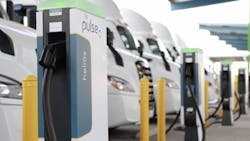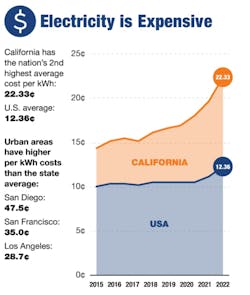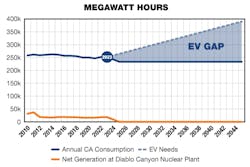Is California ready for an electrified future?
Last December, the American Transportation Research Institute published a report on the challenges the U.S. will face when developing charging infrastructure for an electrified vehicle future. To support a future with 100% EV adoption, the state of California would have to produce 57.2% more electricity than it currently produces, according to the report. ATRI released another report recently, expanding upon those findings.
California is the second highest state in the nation for electricity consumption, and consuming electricity there is rather expensive. At a state average of 22.33 cents per kWh, electricity costs almost double the national average (12.36 cents per kWh), according to the report.
The report, Is California Ready for an Electric Vehicle Future?, states that even the future of current California electricity generation plants is uncertain. Back in 2018, the California Public Utilities Commission planned to close a nuclear power plant, Diablo Canyon—which produces up to 9% of the state's electricity—by 2025. Recently, however, and with pushback from environmentalist groups, a state judge approved operation of the nuclear plant until 2030 as long as certain conditions are met. Another top California electricity generating plant, Moss Landing Power Plant, has seen its capacities decrease over the years, shutting down two of its units in 2016 because their "older technology made them inefficient," according to a local news outlet.
Not only is electricity generation a concern for the report's authors but so is the economy.
California's supply chain will become more expensive, according to report authors. The cost of a battery-electric truck is more than double the cost of a similar vehicle with a diesel engine, and "the cost to power a battery-electric truck, including equipment, installation, utility upgrades, and electricity, could be as high as $1.21 per mile, nearly double the cost per mile of diesel fuel," states the report.
After these trucks are purchased and in service, they'll need a place to charge. Parking for any truck has been an ongoing concern. Currently, there is only one parking space for every 11 trucks in the U.S. Now add charging capabilities to each parking space. California has 13,144 truck parking spaces, and it will cost the state $1.472 billion to add chargers. Additionally, just purchasing and installing these chargers would cost $2.878 billion.
See also: Scaling infrastructure: Where to begin?
Finally, ATRI closes its report with an astounding fact. Using data from ATRI's Operational Costs of Trucking 2023 report, ATRI researchers found that if every diesel-powered truck were replaced with an electric truck with equal capabilities, "one-third of the truckload sector would suddenly be too heavy for U.S. roads."
To combat this, additional electric trucks would be required to move the same amount of freight by diesel-powered trucks.
"For every 1,000 trucks, an additional 343 trucks would be required due to battery weight," stated the report.
Replacing a century-old diesel and gasoline engine infrastructure model with charging infrastructure and developing vehicles that will economically meet upcoming emissions standards and ESG goals will take time. But with California's CARB emissions regulations quickly approaching, fleets can't leave their charging needs up to the state, as ATRI's report makes evident.
See also: How fleets can prep for California's Clean Truck Check program
About the Author
Jade Brasher
Senior Editor Jade Brasher has covered vocational trucking and fleets since 2018. A graduate of The University of Alabama with a degree in journalism, Jade enjoys telling stories about the people behind the wheel and the intricate processes of the ever-evolving trucking industry.



